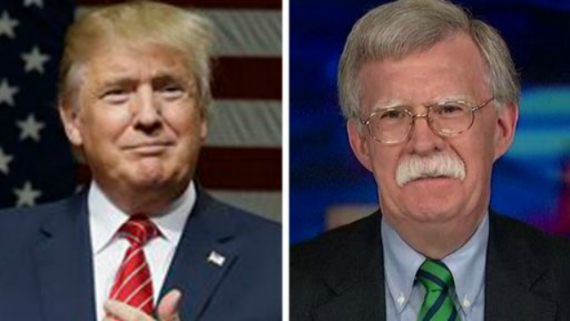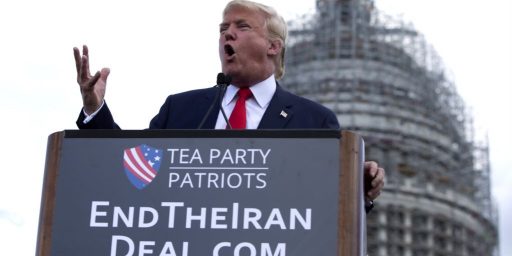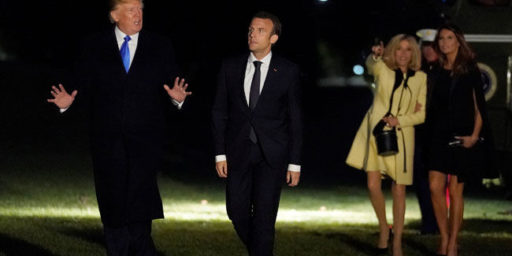Trump And Bolton Will Alienate Allies, Embolden Enemies, & Endanger Americans
In selecting John Bolton as his National Security Adviser, Donald Trump has signaled to the world that he's likely to take action that will only serve to make the world a more dangerous place.
With John Bolton set to come onboard at the White House as National Security Adviser on April 9th, there’s been much speculation about what that could mean for American foreign policy going forward. While that remains unclear in some respects, one thing that does seem certain is that it means that President Trump will pull the plug on American participation in the Joint Comprehensive Plan Of Action (JCPOA), the agreement reached in 2015 that allowed for the first-ever international inspections of Iran’s nuclear research program in return for the lifting of international sanctions imposed specifically in response to that program.
It’s been apparent, of course, that the Trump White House was on course to take this action since long before the Trump was elected President. During the campaign for the Republican nomination, for example, Trump repeatedly attacked the deal, often using false information to attack the merits of the deal and to claim that he could have negotiated a better deal. In September 2015, while Congress was considering the agreement, Trump co-hosted a rally with fellow Republican candidate for President Ted Cruz seeking to rally support against the agreement. In the end, of course, that effort failed and the deal went into effect, but that didn’t stop Trump from continuing to criticize the deal during the primary and the general election.
Once he became President, Trump’s disdain for the deal and his desire to fulfill his campaign promise to either renegotiate the deal or pull out of it was rather obvious. Trump took a pass on his first opportunity to renege on the deal when he decided to authorize lifting another set of sanctions as required by the agreement, The President’s reluctance to take this action was apparent at the time, though, and the prospect of the United States taking action that could cause the JCPOA itself to collapse entirely was very much in the cards. The first step in that potential process came in October when President Trump declined to certify to Congress that Iran was complying with the deal. This happened despite the fact that all of the President’s top foreign policy advisers, including Secretary of Defense James Mattis and soon to be former Secretary of State Rex Tillerson, had stated that Iran was in compliance with its obligations under the agreement and that staying in the JCPOA was in the national interest of the United States. It also came notwithstanding the fact that the International Atomic Energy Agency (IAEA), the agency charged with running the inspections called for under the agreement, said that Iran is complying with the agreement in its most recent report on the agreement. While doing this didn’t formally result in the withdrawl of the United States from the agreement, it was taken at the time as a sign that this was most definitely the direction that the Administration was headed.
The next step in that process could come in May, when the United States is scheduled to drop another set of sanctions against Iran as required under the deal. Many people have speculated that the President will use that occasion to back out of the deal entirely or to demand that it be renegotiate, something which clearly seems to be a non-starter interenationally. Recent foreign policy team moves such as the selection of Mike Pompeo to replace Rex Tillerson as Secretary of State have raised the likelihood of that happening in the eyes of most observers, and the fact that Pompeo will be joined by Bolton would seem to make it all but certain that Trump will seek to pull the plug on the agreement in the very near future.
Wendy Sherman, who served as Under Secretary of State for Political Affairs in the Obama Administration and was the principal negotiator for the United States during the talks that lead to the JCPOA, warns that doing so would like result in very negative consequences for the United States:
Mr. Trump appears committed to killing it. Mr. Bolton’s appointment has only cemented the expectation that the nuclear deal’s life expectancy is short. May 12 is the next deadline by which the president has to extend sanction waivers and certify Iran’s compliance to preserve the accord. If he doesn’t, the fallout will be profound.
First and foremost, Iran most likely will move quickly, without any restraint, to enrich uranium, the fissile material needed for nuclear weapons. The Islamic Revolutionary Guards Corps, the leading edge of Iran’s nefarious actions, will declare that the West can never be trusted and will use the decision to undermine the less hard-line president, Hassan Rouhani.
The destruction of the nuclear deal will also increase the Revolutionary Guards’ malign activities in the Middle East, making the challenge to Israel’s security and to America’s other allies even more difficult. These activities, in turn, will increase American calls for military action against Iran as the only viable option, since no Iranian will be able to enter new negotiations with the United States any time soon.
The march to military conflict will be hard to stop, especially with Mr. Bolton leading the National Security Council.
Beyond this horror show, the decision to destroy the Iran deal will also pound yet another nail into the coffin of the trans-Atlantic relationship. Mr. Trump has so far laid the taskof “fixing” the deal at the feet of Britain, France and Germany, America’s European partners in the nuclear negotiations. He has demanded that they agree to new language on Iran’s ballistic missile development and inspections of Iranian military installations, and he has asked for a change in the timeline of the nuclear deal so that the restrictions on Iran will not expire. In essence, he has asked Europe for help changing the terms of the deal itself.
(…)
Finally, if the White House rips up the Iran deal, it will give the United States exactly what it needs least: international isolation. The deal was negotiated by the United States, Britain, France, Germany, Russia and China, coordinated by the European Union, and endorsed by a 15-to-0 vote in the United Nations Security Council. Mr. Trump will not isolate Iran by nixing the deal; he will isolate America and lead its partners and allies to consider China and Russia as more dependable, predictable partners, even absent Western values.
Nothing about this decision will increase American security. It will be a leap into the unknown, with devastating consequences. Once lost, the hard-won trust and faith in America will not be easily regained. Mr. Bolton and Mr. Trump should not make this huge mistake.
Sherman is, of course, exactly right. While it’s far from perfect and there remain many issues between Iran and the United States. the JCPOA was a fairly significant achievement in that it was the culmination of what was clearly a successful effort by the Obama Administration, working together with both America’s major allies in Europe and Russia and China, to impose international sanctions designed to force Iran to come to the negotiating table to discuss its nuclear program for the first time ever. Those talks resulted in an international agreement that led to the Islamic Republic giving up substantial parts of its nuclear research program that, if complied with, would guarantee that it could not make progress toward developing a nuclear weapons for several decades to come. It also led to the first ever regime of international inspections designed to verify Iranian compliance with the agreement, something which clearly seems to be occurring based upon all of the available evidence. Given that, taking action that would potentially wreck the deal would be foolhardy given the fact that it would embolden Iranian hardliners, alienate America’s allies, and isolate the United States even further than Trump has managed to do in the past year.
As Sherman notes elsewhere in her piece, though, the biggest impact of undermining the JCPOA could be what it means for the situation on the Korean peninsula. If the President does end up following up on his campaign promises and the path that he has laid out beginning with last October’s decertification decision, then he will send a signal to the North Koreans that the United States cannot be trusted to live up to international agreements from one Administration to the next, and that this President in particular cannot be trusted to adhere to the international agreements that the United States has entered into. It will no doubt raise similar concerns among the American allies that would be most closely impacted by negotiations with North Korea such as South Korea and Japan. This will only make the already difficult process of reaching any kind of agreement with the Kim regime even more difficult and could ultimately mean that any such talks are doomed to fail precisely because Donald Trump is more interested in fulfilling an utterly unwise campaign promise than in acting in the best interests of the United States.





Donald Trump is more interested in
fulfilling an utterly unwise campaign promisefluffing his ego than in acting in the best interests of the United States.FTFY Doug.
So…the people who told us Trump was wrong on North Korea are telling us Trump is wrong on Iran. Not only that, but the people who told us Trump was wrong on North Korea and is wrong on Iran are the same people who previously told us we had a deal to prevent North Korea from getting nukes in the first place.
Here’s a question: If we stick with the Iran deal and eight years from now they announce they have nukes…what will happen to Wendy Sherman?
Mike
@MBunge: Here’s a question for you: in what way do you think the North Korea situation has improved due to Trump? Because nothing has changed.
@MBunge:
Here are questions for you:
(1) If we leave the Iran deal do you think that that – with American embargos, trade sanctions, and threats to our allies to join us – will prevent Iran from getting nuclear weapon capability?
(2) if we leave the deal behind, and 8 years from now Iran announces that they have nuclear weapons, will John Bolton be blamed?
I personally believe that the deal at the minimum puts us at the the table along with our allies, where we have some influence. And it probably slows their efforts to secure nuclear weapons capability.
I also believe that Iran, like many other countries in the world, has the ability to eventually develop a nuclear capability, whether we like it or not. Our conceit is that we can control the rest of the world with respect to this issue.
@MBunge: Heck, the Iranians don’t have to develop a nuke. Just mine the Straits of Hormuz and cause a few oil tankers to sink and block the passage.
You really think that the U.S. economy can handle a $200/bbl oil price shock?
As it is, no one’s going to follow us if we tear up our treaty with Iran. Trump is idiotic enough to think that he can threaten the EU and the rest of the world to go along with this. Or maybe he’s stupid enough to think that acting as a cat’s paw for Israel and the Saudis and attacking Iran is going to solve problems.
You’re continually supporting an awfully dumb POTUS. Why?
@al-Ameda:
Just about any country with a modicum of industry and a small cadre of physicists, chemists and engineers can build a nuclear weapon. It’s really not that hard.
But there are degrees.
A simple fission-only weapon is relatively easy, but yields top below the megaton range (not entirely sure about this). If you want a bigger bang, you need tritium to make either tritium-boosted fission weapons or fusion (hydrogen) bombs.
Tritium is commercially available (it’s what gives the glow to EXIT signs, for example), but at very small quantities and it’s tightly controlled. it’s also very expensive. To make it yourself you need a specific type of nuclear reactor, I think the same type used to produce plutonium.
It also has a limited shelf-life. it decays into Helium-3 (He-3). Whereas tritium, with one proton and two neutrons, releases neutrons for nuclear reactions, He-3, with two protons and one neutron, absorbs neutrons and makes them unavailable for nuclear reactions.
Delivering the weapon on the desired target is where things get difficult.
BTW, I don’t think North Korea needs to look at the fate of the Iran deal to know the US doesn’t keep its word across administrations. They have their deal with America, the Agreed Framework, they can point to.
“Here’s a question: If we stick with the Iran deal and eight years from now they announce they have nukes…what will happen to Wendy Sherman?”
Iran has the most intense inspections in history. If they were able to do that with the current level of inspections they do it even if the deal was made permanent, Trump’s goal. Thyecould have just not signed the treaty and made them already if that was their real goal. Any other stupid questions?
Steve
Wow. I think the thing that I find most troubling about this turn of events is that it looks as though the US is looking to start down the road of some sort of American version of NK’s Juche (by ourselves) policy. You would think that seeing in real time, over 60 some years how that’s been working for North Korea would tell us something, but then, you see what Bunge is saying…